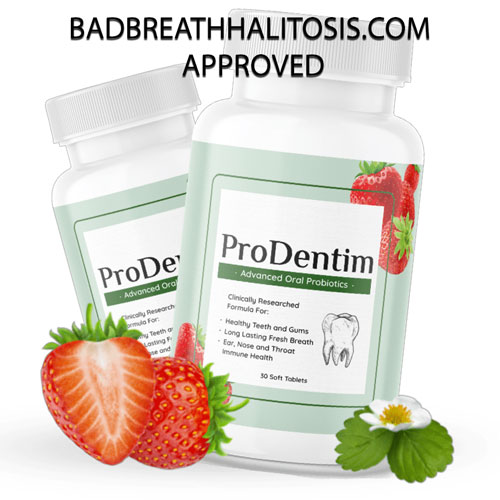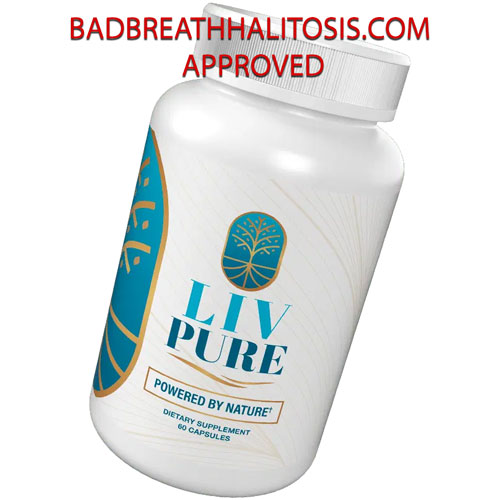Iv been up late tonight. I was thinking as usual about the situation, and I came up with a theory. Its based on that harvard study on bad breath. They basicly found that strain of bacteria in the mouth, and it was in those who had bad breath but never those who didnt etc. It said that that type of bacteria was found in the mouths of fresh breath people if they had periodental disease.
So my theory is this, excluding those who have a rotten tooth etc, the tongue plaque related bad breath, could be caused because we had periodental disease, the bacteria came with this, and due to our mouths being a better environment than most,( we have pnd etc) the bacteria settled and got a foothold on our tongue. And now its settled its tough to get rid off. Mainly due to the mouth being part of the alimentary canal which is technically outside our body. The immune system cant control this as much so its just left to floral balance.


a thought
-
halitosisux
- Moderator
- Posts: 3266
- Joined: Wed Oct 29, 2008 1:29 pm
Hi asd,
This theory makes a LOT of sense to me.
A lot of people with chronic BB who seemingly have no dental problems, reported that they DID have a period in their lives when they DID have dental (or just hygiene) issues, including myself.
In addition to your valid reasonings, could it also be that this bacteria which is responsible, has asymptomatically taken over somewhere else, such as the sinuses or other susceptible anaerobic areas?
It's feasible that it could have spread there, and in the same manner its now doing the opposite and ensuring our mouth flora is constantly supplied with this germ, through PND or other means.
It would also explain how people seem to "catch" BB, and once it's latched onto us in this way, we're screwed.
Are there any known antibiotic treatments that are effective against this known germ?
Maybe, if it is hiding in the sinuses for instance, it requires much longer duration of antibiotic treatment to eradicate, and could explain why typical antibiotic courses havent worked. This particular germ has only recently been discovered too.
People had to put up with stomach ulcers because no one could believe that bacteria could live in the hostile acidic environment of the stomach and it was dismissed for decades as a cause. It wasnt until a young australian doctor simply looked more closely and proved them all wrong.
This theory makes a LOT of sense to me.
A lot of people with chronic BB who seemingly have no dental problems, reported that they DID have a period in their lives when they DID have dental (or just hygiene) issues, including myself.
In addition to your valid reasonings, could it also be that this bacteria which is responsible, has asymptomatically taken over somewhere else, such as the sinuses or other susceptible anaerobic areas?
It's feasible that it could have spread there, and in the same manner its now doing the opposite and ensuring our mouth flora is constantly supplied with this germ, through PND or other means.
It would also explain how people seem to "catch" BB, and once it's latched onto us in this way, we're screwed.
Are there any known antibiotic treatments that are effective against this known germ?
Maybe, if it is hiding in the sinuses for instance, it requires much longer duration of antibiotic treatment to eradicate, and could explain why typical antibiotic courses havent worked. This particular germ has only recently been discovered too.
People had to put up with stomach ulcers because no one could believe that bacteria could live in the hostile acidic environment of the stomach and it was dismissed for decades as a cause. It wasnt until a young australian doctor simply looked more closely and proved them all wrong.
-
TeamZissou
- Advanced
- Posts: 143
- Joined: Mon Nov 10, 2008 11:01 pm
Sounds like a good thought to me too. The fact that so many people have been temporarily cured while on a course of Metronidazole proves, to me at least, that this is a chronic infection with some strain of specific bacteria, probably the ones already mentioned.
Either the antibiotic didn't completely kill off all the bacteria in the people who weren't cured, or maybe they're being constantly reinfected somehow.
Maybe using the same toothbrush or glass as you were before you started the drug reintroduced the bacteria? This seems possible to me, but it probably is just the fact that some bacteria were resistant and remained. This is why taking two or more antibiotics at once seems like the answer, while at the same time being careful not to reintroduce the bacteria.
I just don't know if I buy the fact that we have some specific problem that makes the bacteria more likely to take hold. As has been said, millions and millions of people have PND, allergies, GERD, etc. etc., but no BB.
Either the antibiotic didn't completely kill off all the bacteria in the people who weren't cured, or maybe they're being constantly reinfected somehow.
Maybe using the same toothbrush or glass as you were before you started the drug reintroduced the bacteria? This seems possible to me, but it probably is just the fact that some bacteria were resistant and remained. This is why taking two or more antibiotics at once seems like the answer, while at the same time being careful not to reintroduce the bacteria.
I just don't know if I buy the fact that we have some specific problem that makes the bacteria more likely to take hold. As has been said, millions and millions of people have PND, allergies, GERD, etc. etc., but no BB.
maybe its liek a fire. A fire needs oxygen, fuel and a spark. Maybe our bodies have the 'oxygen' -the right environment, the 'fuel'(the pnd) and then the infection was the spark.
Teamziz that 2 anitbiotic at once is a good thought. We need to do that for sure. If not 3. But preferably they would want to be all anti anaerobic antibiotics. Also cleaning out toothbrushes etc is also vital to stop reinfection.
I had a toothbrush that I left in a bottle of hydrogen peroxide. It kept it clena for a while, until... the bactria took over. The bottle stank and had colonies in it.
What must of happened is the hydrogen peroxide was completely oxidised to water and the bacteria hiding on the toothbrush survived long enough for this to happen an then reproduced.
Teamziz that 2 anitbiotic at once is a good thought. We need to do that for sure. If not 3. But preferably they would want to be all anti anaerobic antibiotics. Also cleaning out toothbrushes etc is also vital to stop reinfection.
I had a toothbrush that I left in a bottle of hydrogen peroxide. It kept it clena for a while, until... the bactria took over. The bottle stank and had colonies in it.
What must of happened is the hydrogen peroxide was completely oxidised to water and the bacteria hiding on the toothbrush survived long enough for this to happen an then reproduced.
-
TeamZissou
- Advanced
- Posts: 143
- Joined: Mon Nov 10, 2008 11:01 pm
I think if the bad bacteria were completely eliminated, and your mouth was given time to repopulate with a more healthy flora, then being exposed to some of the BB bacteria might not lead to reinfection.
I just think the period right after you end the antibiotics you are very sensative to reinfection, because your mouth has been almost entirely cleared of any bacteria.
As has been said, this probably began because of a dental problem in the past, or course of antibiotics that originially messed things up. For many people at least. I doubt simply getting a small amount in your mouth would lead to this problem, or half the world would have it. Although yes, it seems like it can be caught through repeated intimate contact in some cases.
I just think the period right after you end the antibiotics you are very sensative to reinfection, because your mouth has been almost entirely cleared of any bacteria.
As has been said, this probably began because of a dental problem in the past, or course of antibiotics that originially messed things up. For many people at least. I doubt simply getting a small amount in your mouth would lead to this problem, or half the world would have it. Although yes, it seems like it can be caught through repeated intimate contact in some cases.
-
halitosisux
- Moderator
- Posts: 3266
- Joined: Wed Oct 29, 2008 1:29 pm
Thinking about this theory and some established facts..
We have odour on the back of our tongues that is perceivable in our breath. Is it due to some specific types of bacteria that we unfortunately have present there, or is there a specific reason that the general bacterial activity is greater in us than BB-free people? Or are the chemicals that are naturally produced by this bacterial activity able to build up or just not being dealt with normally?
Can we even be sure that this odour is being produced by oral bacteria and not chemicals in our bodily secretions which find their way there? Assuming that our oral bacteria are solely responsible for this odour, does anyone know whether our immune system can determine our individual populations of oral bacteria? Or are the different species, to which we are also in constant external contact with, left to constantly battle it out for themselves within our unique environment of the oral cavity?
Im asking these questions because im wondering whether or not its possible that our oral flora can become "infected" in the ways we're describing here, apart from when certain conditions that may suddenly appear, such as periodontal disease or tonsillitis, which then harbour certain species and allow them to populate the mouth at the same time.
There are roughly 700 identified species of oral bacteria, of which 400 are typically present at any one time, and its typically the same 400 species in a normal healthy mouth. But if it is all determined by our immune system then one hope is to work alongside it with the creation of different drugs that can target and eliminate any unfavourable species. Or finding ways of manipulating the immune system itself to target what we want (or not want) it to target. Or just some simple lateral way of neutralizing our oral odours.
I just feel like there might possibly be a connection to the immune system and oral bacterial populations. Allergies are due to the immune system, and they can suddenly appear and disappear randomly - as can chronic BB. I was also wondering if the reckless use of antibiotics might also have left us with strains of "super-BB" producers, but this has been a problem since before the discovery of antibiotics, so probably not very likely.
EDIT: forgot to mention genetic modification of the bacteria themselves is SURE to deal with our problem too someday.
EDIT2: Also forgot to mention that if the immune system is able to "select" our oral flora populations, this would explain why apart from making it impossible to permanently eradicate certain types of bacteria, it also explains why its impossible to permanently populate ourselves with "friendlier" bacteria.
EDIT3: Another point i'd like to mention here is the coinciding of the onset of some people's BB and a course of antibiotics. Surely to be given antibiotics in the first place was to deal with an infection of some kind? Could it be that for whatever reason, the bacteria responsible for the infection remained or mutated? Im saying this because the general concensus seems to be that antibiotics were responsible for allowing candida overgrowth or whatever.
We have odour on the back of our tongues that is perceivable in our breath. Is it due to some specific types of bacteria that we unfortunately have present there, or is there a specific reason that the general bacterial activity is greater in us than BB-free people? Or are the chemicals that are naturally produced by this bacterial activity able to build up or just not being dealt with normally?
Can we even be sure that this odour is being produced by oral bacteria and not chemicals in our bodily secretions which find their way there? Assuming that our oral bacteria are solely responsible for this odour, does anyone know whether our immune system can determine our individual populations of oral bacteria? Or are the different species, to which we are also in constant external contact with, left to constantly battle it out for themselves within our unique environment of the oral cavity?
Im asking these questions because im wondering whether or not its possible that our oral flora can become "infected" in the ways we're describing here, apart from when certain conditions that may suddenly appear, such as periodontal disease or tonsillitis, which then harbour certain species and allow them to populate the mouth at the same time.
There are roughly 700 identified species of oral bacteria, of which 400 are typically present at any one time, and its typically the same 400 species in a normal healthy mouth. But if it is all determined by our immune system then one hope is to work alongside it with the creation of different drugs that can target and eliminate any unfavourable species. Or finding ways of manipulating the immune system itself to target what we want (or not want) it to target. Or just some simple lateral way of neutralizing our oral odours.
I just feel like there might possibly be a connection to the immune system and oral bacterial populations. Allergies are due to the immune system, and they can suddenly appear and disappear randomly - as can chronic BB. I was also wondering if the reckless use of antibiotics might also have left us with strains of "super-BB" producers, but this has been a problem since before the discovery of antibiotics, so probably not very likely.
EDIT: forgot to mention genetic modification of the bacteria themselves is SURE to deal with our problem too someday.
EDIT2: Also forgot to mention that if the immune system is able to "select" our oral flora populations, this would explain why apart from making it impossible to permanently eradicate certain types of bacteria, it also explains why its impossible to permanently populate ourselves with "friendlier" bacteria.
EDIT3: Another point i'd like to mention here is the coinciding of the onset of some people's BB and a course of antibiotics. Surely to be given antibiotics in the first place was to deal with an infection of some kind? Could it be that for whatever reason, the bacteria responsible for the infection remained or mutated? Im saying this because the general concensus seems to be that antibiotics were responsible for allowing candida overgrowth or whatever.
Its late but I read your post halitosisux. The thing about selecting the oral flora, I doubt it would be able to have that much influence there. the mouth is basicly outside the body. The only thing the body can do is control saliva and mucus. So it could not fight bad bacteria on the tongue. Therefore if you imagine the mouth being a culture of bacteria, you could add certain chemicals to it etc, but the bacterial population would be decided mainly by which species wins out. SO you could tip the environment in favour of a type of bacteria, but you could not outright control it unless you used powerful chemicals to kill much of the bacteria off.
Also evolutionarily, bad breath wouldnt really be a big issue, no one would fail to pass on their genes because of it, so the body wont be that competent at dealing with it either.
Also evolutionarily, bad breath wouldnt really be a big issue, no one would fail to pass on their genes because of it, so the body wont be that competent at dealing with it either.
-
halitosisux
- Moderator
- Posts: 3266
- Joined: Wed Oct 29, 2008 1:29 pm
Thanks for that reply asd,
what really got me thinking about this is the complexity of the relationship between the gut flora and the immune system there. Read about it on wikipedia and it makes u wonder whether germs in the mouth really do just settle it between themselves or not.
I agree with what you say though, regarding the environmental factors influencing everything. I really hope that we can modify our oral flora, just enough so that it can settle down and allow our mouths to stay fresh.
what really got me thinking about this is the complexity of the relationship between the gut flora and the immune system there. Read about it on wikipedia and it makes u wonder whether germs in the mouth really do just settle it between themselves or not.
I agree with what you say though, regarding the environmental factors influencing everything. I really hope that we can modify our oral flora, just enough so that it can settle down and allow our mouths to stay fresh.
